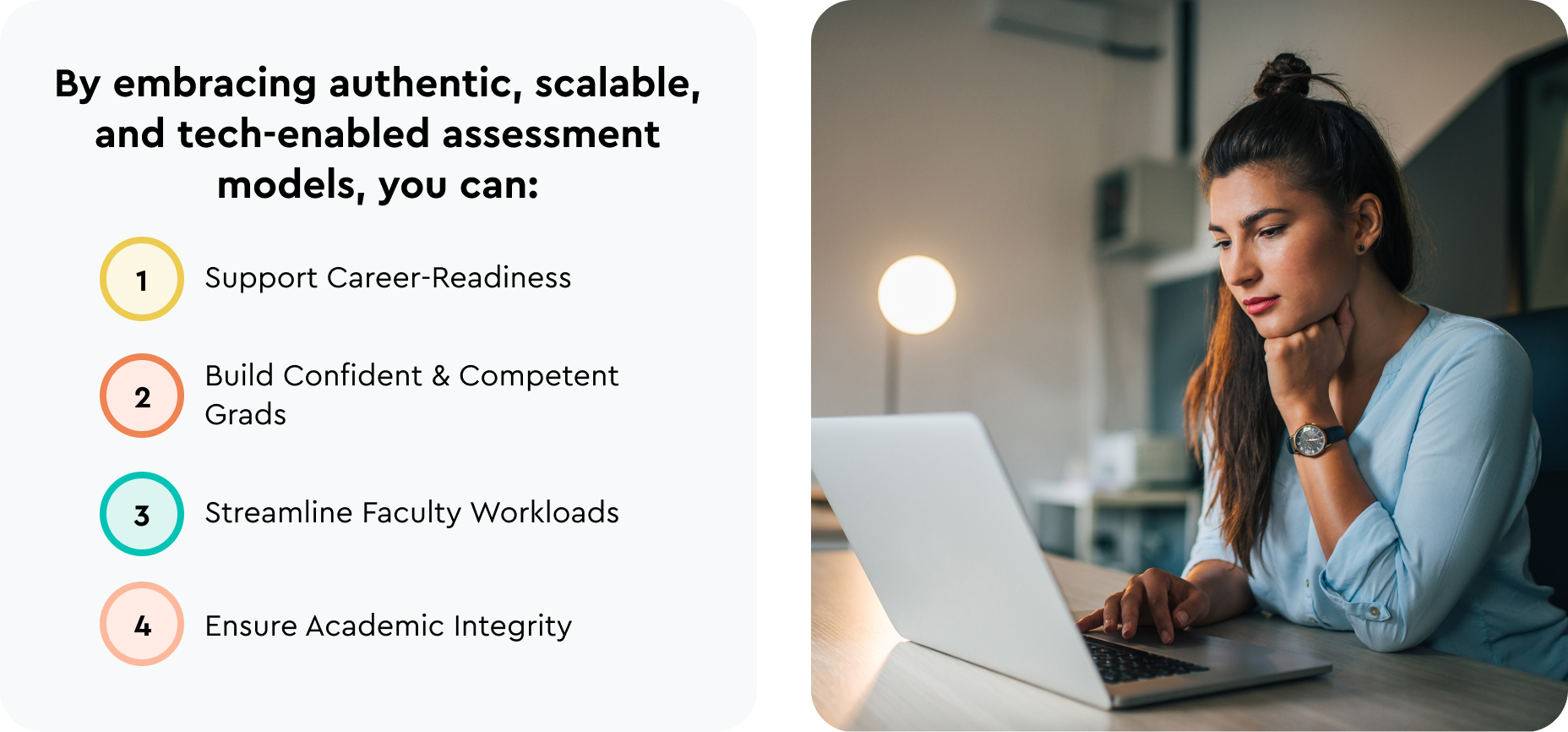In today’s evolving higher education landscape, ensuring students graduate with real-world competencies is more critical—and more complex—than ever before. Traditional assessments like essays, multiple-choice tests, and quizzes have long served as the backbone of evaluating student learning. But with the rise of AI tools like ChatGPT, changing workforce demands, and growing pressure to prove outcomes, many institutions are discovering that their current assessment strategies aren’t keeping up.
Here are three clear signs your assessment strategy may no longer be effective, and what you can do to move forward with confidence.

1. Your Assessments Measure Memory, Not Mastery
In today’s job market, employers care less about what students can recite and more about what they can do. According to industry reports, competencies like communication, critical thinking, and adaptability are more valued than ever. Yet many assessments still test students’ ability to memorize and regurgitate information—rather than apply it.
Why it Matters:
This disconnect leaves students unprepared for real-world challenges and undermines the institution’s promise to deliver career-ready graduates. When assignments don’t mirror workplace tasks, students miss opportunities to build confidence and competence in meaningful ways.
What to do Instead:
Incorporate authentic assessment into your strategy. Think: role-plays, project-based learning, and video-based demonstrations where students show—not just tell—what they’ve learned. These formats allow students to engage in experiential learning, practice skills in context, and receive feedback that promotes growth. Platforms like GoReact, now part of the Echo360 Echosystem, enable this by providing video-based skill demonstration tools that are simple to implement and evaluate.

2. You’re Unsure if the Work is the Student’s
The explosion of generative AI tools has made it easier than ever for students to complete assignments without deeply engaging in the learning. Whether it’s AI-generated essays or code snippets, the authenticity of submitted work is now a top concern for instructors across disciplines.
Why it Matters:
When faculty can’t be confident in the integrity of student submissions, it compromises the entire learning process. Academic standards erode, and instructors are forced into reactive strategies—like rewriting syllabi or creating AI-proof exams—without addressing the core issue.
What to do Instead:
Shift the focus from “What did the student write?” to “What can the student do?” Video-based assessments allow instructors to observe a student’s thought process, communication skills, and understanding in real time. Whether it’s practicing a pitch, explaining a concept aloud, or responding to prompts with limited prep, students are challenged to demonstrate knowledge authentically.
By using tools that support secure, asynchronous recording and feedback, institutions can preserve academic integrity and re-center assessment around learning and growth—rather than policing and punishment.

3. Your Instructors are Overwhelmed and Burnt out
If your current assessment methods rely heavily on manual grading, time-consuming observations, or repetitive paperwork, your faculty may be at their limit. With growing class sizes and new digital expectations, instructors need better ways to manage workload while still supporting quality learning.
Why it Matters:
When instructors are stretched thin, students get delayed feedback—or none at all. Without timely input, learners can’t iterate or improve. Faculty get burnt out and dissatisfied, making it harder for institutions to retain top talent.
What to do Instead:
Leverage AI-powered tools to streamline the feedback loop in GoReact. Instructors can give students the early insights they need to self-reflect and improve with AI-generated feedback—before faculty even step in. Instead of reviewing every minute of video, instructors can focus on the moments that matter most and deliver more targeted, impactful guidance.
Consolidating tools through platforms like Echo360’s Echosystem simplifies the instructor experience reducing tech fatigue and freeing up time for deeper engagement with students.

A Smarter Path Forward
Instructional leaders are tasked with a big responsibility: ensuring that learning outcomes aren’t just aspirational, but measurable and meaningful. If your current strategy isn’t helping students build relevant skills, prove their competency, and grow from feedback, it’s time to rethink your approach.
By embracing authentic, scalable, and tech-enabled assessment models, you can:
- Support Career-Readiness: Students graduate with demonstrable skills that align with workforce needs.
- Build Confident & Competent Grads: Through practice, feedback, and reflection—not just testing.
- Streamline Faculty Workloads: By reducing manual grading and enhancing assessment quality with AI.
- Ensure Academic Integrity: With assessments that are harder to game and easier to verify.
Your assessment strategy should do more than generate grades. It should empower students to learn deeply, apply knowledge meaningfully, and graduate ready to thrive. And for instructors, it should be sustainable and insightful, not overwhelming.
If any of these signs ring true at your institution, you’re not alone. The good news is that with the right tools and mindset shift, you can transform assessment into one of the most powerful levers for student success.












